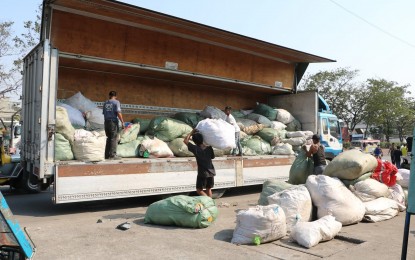Environment & Nature
Nestlé partnership to cut plastic footprint

REDUCING PLASTIC FOOTPRINT. Sacks of soft plastic waste are collected in Baseco, Tondo, Manila as Nestlé Philippines and Plastic Credit Exchange (PCEx) partner to cut plastic footprint. Aside from Baseco, soft plastic wastes are diverted from landfills in Payatas, Quezon City and Rodriguez, Rizal. (Photo courtesy of Nestlé Philippines via PNA)
MANILA – Food and beverage maker Nestlé Philippines strengthens its partnership with the private sector for its plastic waste collection, recycling, and recovery program to reduce plastic footprint.
In a statement, Nestlé Philippines has partnered with Plastic Credit Exchange (PCEx) to gather soft plastic waste from Baseco in Tondo, Manila, Payatas in Quezon City, and Rodriguez in Rizal that will be co-processed and diverted from the landfill.
“With plastic waste continuing to accumulate in landfills and oceans, the need for tackling plastic pollution has never been so pressing. It is an urgent priority for us and an issue we take seriously,” said Nestlé Philippines Chairman and Chief Executive Officer Kais Marzouki.
Nestlé Philippines is also supporting PCEx and the City of Manila in their ‘Aling Tindera’ Waste-to-Cash program.
Under this program, sari-sari stores owned by women can earn points from the post-consumer plastic waste that they will collect and can be redeemed for cash.
The ‘Aling Tindera’ Waste-to-Cash program aims to increase income opportunities for women micro-entrepreneurs, to have an organized plastic waste collection, and cleaner environment and improved health for the community.
Nestlé Philippines is providing the container vans for each participating sari-sari store as storage for the collected plastic waste.
“We are determined to look at every option to solve complex packaging challenges and embrace multiple solutions that can have an impact now. For our part, we at Nestlé envision a waste-free future in the face of these complex challenges. We are glad to be taking a concrete step, one among many, toward realizing that vision through our partnership with PCEx,” Marzouki added.
PCEx is a non-profit organization, an offshoot of HOPE in a Bottle, a bottled water brand that commits to give 100 percent of its profit to build public school classrooms in partnership with the Department of Education.
PCEx Founder and President Nanette Medved-Po recalled that the HOPE initiative “in a way started with Nestlé”.
“Years ago, their Philippine CEO reached out to me about projects that Nestlé was supporting – like eco-bricks. From there, HOPE began to explore environmentally sustainable and affordable ways for companies to be responsible for their plastic footprints. In 2019, we established the Plastic Credit Exchange from our learnings and came back to Nestlé whom we felt would be a natural partner, given our common goals for sustainability,” Medved-Po said.
Aside from these initiatives, Nestlé commits to eliminate 130 metric tons of plastic straws by end-2020 as it shifts the plastic straws for ready-to-drink products to paper straws.





















